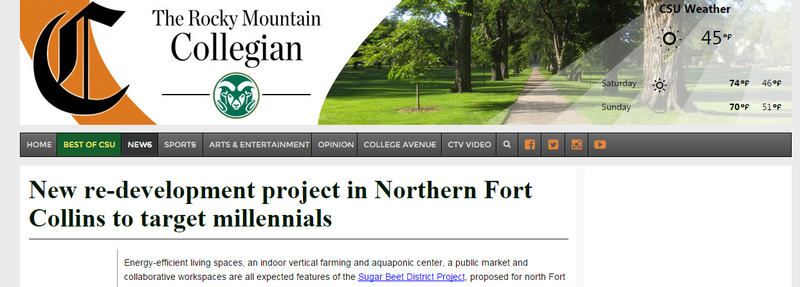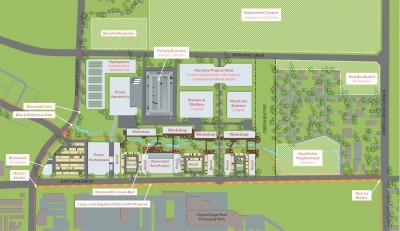New re-development project in Northern Fort Collins to target millennials
Energy-efficient living spaces, an indoor vertical farming and aquaponic center, a public market and collaborative workspaces are all expected features of the Sugar Beet District Project, proposed for north Fort Collins by developer Mickey Willis and his team.
The comprehensive planned community would be constructed adjacent to the former Fort Collins Sugar Beet Factory, just north of the Cache la Poudre River, Mickey Willis said. It could be an outlet for Fort Collins’ working-age population, particularly Colorado State University graduates, with spaces for living, work and play.
The final proposal will be submitted in the next six months to the Fort Collins City Council, Willis said.
“We want to create that space that will encourage graduates to stick around and make a life here,” said Carson Willis, son of Mickey and the community benefit director.
Part of the appeal for young adults may be the housing structures Carson Willis is calling “Pocket Housing,” which are small, minimalistic apartments designed intentionally for shared-space living. Mickey Willis said the design is centered around fostering community, inspired by his time living on military bases.
“We want to bring intentional community to Fort Collins,” Mickey Willis said.
The project’s building materials are expected to include a substance called “hempcrete,” a mixture of hemp and calcium carbonate, which is a deposit left over in the area by years of sugar beet farming. The planning includes CSU research that has been done on the strength of hemp as a building material.
A map of the planned Sugar Beet District project in Fort Collins.
“Hempcrete is a highly sustainable material that not only is cool and the forefront of building materials, but also helps to do a ‘brown-field’ clean-up of the area,” Mickey Willis said. “It will cost O’Dell Brewery nearly $3 million just to move the calcium carbonate off their (nearby) land, and we have a use for it.”
Businesses included in the project are invite-only, said Mickey Willis, and must be categorized as public-benefit corporations. Praxis Marketplace, a combination grocer and food-grower dedicated to community-building, will occupy a 30,000 square foot facility within the district. It will be supplied by an indoor farm and hydroponics facility that simultaneously raises fish for food and uses their waste to grow crops.
A pamphlet designed by the Sugar Beet District Project said the proximity of food production and a grocery store is consistent with the transparency needs of young consumers.
“Customers seek better labeling and they seek to know if their food is handled well or genetically modified,” the pamphlet said. “In the layout of these buildings, customers will have the opportunity to see the clean environment and how workers handle their food.”
An added modern attraction of the project may be its sustainability efforts, which include the development of semi-enclosed bioswales and retention ponds to capture and purify rainwater, while controlling storm water fluctuations. Mickey Willis said the development team will also maintain full architectural control over the community, bringing in “some of the worlds most sustainable architects.”
“We’re not subdividing,” Mickey Willis said. “We’re inviting people who have a piece of the puzzle we need and who will enhance the community. We’re not just trying to sell a piece and make a profit.”
Funding for the project will come from foreign investment through the national EB-5 program. The program connects foreign investors to American projects. Investors who provide a $500,000 loan for development in a target employment area that creates at least ten jobs can be granted permanent residence in the United States.
Mickey Willis is also CEO of an EB-5 regional center and he said he is planning on reaching out to CSU’s international student program to potentially connect with investors.
“This is both a pathway to potential citizenship and community building,” Mickey Willis said. “It’s really the golden ticket for this project.”
The project is estimated to take five years to complete, starting in the next six months with the final development plan submitted to the Fort Collins City Council.
Mickey Willis said he has put seven years of work into the plan, and he has high hopes for the future of the Sugar Beet District.
“It needs a lot of help and we’re the right team to do it,” Mickey Willis said. “There’s an energy in Fort Collins. Something great is about to happen here.”
Mentions
States
- Colorado
Videos





Subscribe for News
Site Digest
Join Professionals on EB5Projects.com →
Securities Disclaimer
This website is for informational purposes only and does not constitute an offer or solicitation to sell shares or securities. Any such offer or solicitation will be made only by means of an investment's confidential Offering Memorandum and in accordance with the terms of all applicable securities and other laws. This website does not constitute or form part of, and should not be construed as, any offer for sale or subscription of, or any invitation to offer to buy or subscribe for, any securities, nor should it or any part of it form the basis of, or be relied on in any connection with, any contract or commitment whatsoever. EB5Projects.com LLC and its affiliates expressly disclaim any and all responsibility for any direct or consequential loss or damage of any kind whatsoever arising directly or indirectly from: (i) reliance on any information contained in the website, (ii) any error, omission or inaccuracy in any such information or (iii) any action resulting therefrom.




